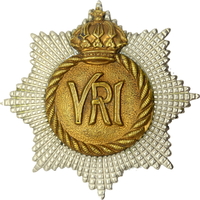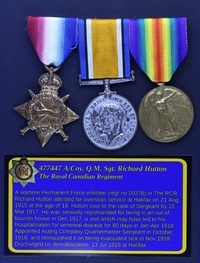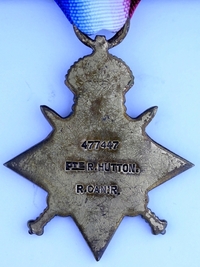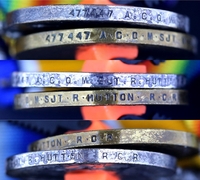
477447 A/C.Q.M.S. Richard Rolfe Hutton
The Royal Canadian Regiment
By: Capt (ret'd) Michael M. O'Leary, CD, The RCR
Richard Rolfe Hutton was born in Sunderland, Durham, England, on 5 Jan 1897. Hutton's family is shown in the 1901 census of England. Parents Thomas (48) and Mary (41) are shown in the census with nine children: Thomas (25), Mary A. (23), Rebecca R. (19), Sarah J. (14), Ethel (12), William (10), Eliza (8), Richard R. (5), and Samuel R. (1).
Hutton emigrated to Canada in 1908 as a Barnardo child. He reached North American shores at Portland, maine, USA, on 23 Mar 1908. The following summary by "JohnWynne62" on ancestry.ca described Hutton's situation:
"Richard Rolfe Hutton was the second youngest of the nine children born to Thomas Hutton, a crane man at the wharf in Sunderland, and his wife, Mary Jane Rolfe whom he had married in 1875. The family were all born and raised in Sunderland and in 1901 were living in Queen Street East, in an area of Sunderland by the docks. When Thomas died in 1902 and Mary Jane in 1907, the two youngest children, Richard and Samuel, were placed in the care of Dr Barnado's Homes. They became just two of the many child migrants who were sent to Canada from the British Isles during the child emigration movement. Many believed that these orphaned and abandoned children would have a better life in rural Canada where families welcomed them as a source of cheap farm labour and domestic help."
An 18-year-old farmer, Hutton enlisted as a soldier of the Canadian Permanent Force with The Royal Canadian Regiment at Toronto, Ontario, on 15 Apr 1915. He was given the regimental number 20276 from a series (20xxx) used for wartime enlistments in the Regiment. Hutton was transferred to the Regiment's principal station at Halifax, Nova Scotia, almost immediately, arriving there on 20 Apr 1915.
Seven months before Hutton reached Halifax as a soldier of The RCR, the Regiment had sailed for Bermuda on 11 Sep 1914, where they served for a year on garrison duty. The Regiment relieved the 2nd Battalion, Lincolnshire Regiment, which sailed immediately for England. Relieved in turn on 12 Aug 1915 by the 38th Overseas Battalion from Canada, The RCR returned to Halifax for a stay of only a week. During this time, the Regiment was re-attested for overseas service. Although The RCR had just spent a year in Bermuda, there were concerns regarding the applicability of the soldiers' Permanent Force enlistments for wartime deployments. This was, perhaps, prompted by the idea that a man on a P.F. three-year engagement could choose not to re-engage and the Government would be obligated to bring him home. Enlistment in the C.E.F., on the other hand, was for the "Duration of War." Accordingly, the soldiers of The RCR were re-attested, signing C.E.F. attestation papers in August 1915 before sailing for Europe.
Hutton attested for service in the Canadian Expeditionary Force (C.E.F.) with The RCR at Halifax, N.S., on 21 Aug 1915. Hutton was described on his attestation paper as 5 feet 5 inches tall, weighing 130 pounds, with good physical development, a 36-inch chest, a dark complexion, brown eyes, and black hair. His religious denomination was Wesleyan. Hutton identified his brother, Thomas Hutton, 6 Alfred St. E., Sunderland, Eng., as his next of kin. On 24 Aug 1915, Hutton was transferred to the Regimental Headquarters at Halifax and held on the roll of the Base Company.
On 26 Aug 1915, The RCR sailed from Halifax aboard the S.S. Caledonian, the same ship that had brought them home from Bermuda. Hutton was posted from the Base Company to "C" Company on 31 Aug 1915 while the Regiment was at sea. Disembarking at Plymouth, England, on 6 Sep 1915, the Regiment went to Shorncliffe for training.
Hutton received a new C.E.F. service number on 28 Sep 1915 to replace the regimental number he received on enlisting. While serving in the C.E.F., his service number would be 477447. Since the Regiment received its C.E.F. numbers while at full strength and not as they were recruited, it had the interesting effect that the soldiers of the Regiment at the time were renumbered in alphabetical order.
On 10 Oct 1915, Hutton was charged and found guilty of absence without leave. He was awarded the punishment of eight days Confinement to Barracks (C.B.) and fined 5 days pay for being absent from 6.00 a.m. 4 Oct 1915 until 12.00 noon 8 Oct 1915.
The RCR crossed the English Channel on 1 Nov 1915, entering the theatre of war at Boulogne, France. During November and December of 1915 the Regiment prepared for service in the trenches, with companies rotating in the lines for training and a period of providing working parties before entering the line as a battalion at the end of December. The first months of 1916 saw the Regiment in the steady rotation through front line trenches, support trenches, and reserve positions that was the fundamental experience of the infantry in the Great War.
Starting January, 1916, Hutton began a Pay Assignment sending $10 each month to his brother, Mr. S. Hutton, Brechin, Ont. In April, 1916, he would increase this to $20 per month.
On 8 Oct 1916, Hutton was admitted to No. 2 Canadian Field Ambulance suffering from myalgia (muscle pain). He was discharged to duty the next day and rejoined the unit in the field on 10 Oct 1916.
Despite his relative youth, Hutton obviously demonstrated leadership potential. Faced with the high rates of turnover as soldiers arrived as reinforcements and left again wounded, sick or having died, there were opportunities for advancement for men who had the right characteristics and demonstrated performance. On 7 Nov 1916, Hutton was appointed Acting Lance Corporal. This was simply an administrative measure, the following day he was promoted to the rank of Corporal (vice Cpl Lonnee, who was promoted).
Early the next year, on 15 Mar 1917, Corporal Hutton was promoted again, to the rank of Sergeant, one month before the assault on Vimy Ridge.
Effective 1 Jul 1917, the Pay Assignment that Hutton had going to his brother was ceased. This cancellation was due to the fact that his brother had enlisted in the C.E.F. and was, by then, serving in England. (Samuel Hutton, 868823, enlisted in the C.E.F. for service with the 182nd Overseas Battalion at Brechin, Ont., on 5 Jun 1916. He served in Canada and England, and was discharged in Canada on 12 Jan 1919.)
In the summer of 1917, Hutton was sent On Command, i.e., a temporary duty assignment without change of parent units, to the First Army Infantry School. Although the details of his task at the school are not noted in his records, a reference to a School piece of correspondence dated 22 Jun 1917 indicated that Hutton was there by that date. Hutton's service record notes that, on 3 Nov 1917, he was retained at First Army School
On 7 Dec 1917, Hutton was charged and, found guilty, severely reprimanded. His crime was "Disobedience of School Order No 4, 3 Dec 1917, i.e., being in a house which was out of bounds.; 1st Army Inf School."
The day after his charge, Hutton found himself returned to the RCR. The incident, however, did not affect his eligibility for privileges. On 9 Jan 1918, he was granted 14 days leave to Paris. Before he could return to the unit from leave, his leisure activities caught up to him. Hutton was admitted to No. 51 General Hospital, Etaples, on 23 Jan 1918 with a diagnosis of "V.D.G.," veneral disease, gonorrhea.
Hutton was discharged from hospital on 12 Apr 1918. While in treatment for venereal, he forfeited his Field Allowance and was placed under stoppage of pay at the rate of 50 cents per diem for the 80 days he was in hospital from 23 Jan to 12 Apr 1918.
Once out of hospital, Hutton was taken on the strength of the 3rd Canadian Infantry Base Depot (C.I.B.D.). A week later, on 20 Apr 1918, he left the 3rd C.I.B.D. for the Canadian Corps Reinforcement Camp (C.C.R.C.) and rejoined The RCR in the field the next day. On the same day he arrived back at the unit, 21 Oct 1918, Hutton was appointed Acting Company Quartermaster Sergeant, with pay (vice 478030 CQMS Woodcock, R.J., appointed A/CSM).
Hutton served the last weeks of the war before the Armistice in the field with his Regiment. On 18 Dec 1918, while the unit was at Bourgeois-sous-Rixensart, France, he was granted 14 days leave to U.K., rejoining the unit on 6 Jan 1919 at Estaimbourg, Belgium.
On 11 Jan 1919, Hutton was back in hospital when he was admitted to No. 51 Casualty Clearing Station. The diagnosis, again, was venereal disease, this time identified as syphilis ("V.D.S.") The same date he relinquished his Acting Appointment of C.Q.M.S. on being admitted to hospital (sick). Hutton was transferred on 16 Jan 1919 to No. 7 General Hospital, Wimereux. Three weeks later, on 6 Feb 1919, he was transferred again, to No. 8 Stationary Hospital at Wimereux.
In early February, 1919, The RCR started their homeward journey to England and then Canada. Hutton would not be returning with the Regiment because he would remain in hospital until his latest affliction was considered cured. As a result, on 6 Feb 1919, he was struck off the strength of The RCR on transfer to Canadian Record List. He also suffered the indignity of hospital stoppages from 6 to 25 Feb 1919 (20 days).
On 25 Feb 1919, Hutton was transferred to No. 3 Canadian General Hospital, Boulogne. He would be discharged from hospital on 23 Mar 1919.
Hutton was posted to the Nova Scotia Regimental Depot (N.S.R.D.) on 21 Apr 1919. The N.S.R.D. was part of a regionally based reinforcement system established in early 1917, with named Depots taking in troops from battalions raised in those areas in Canada and providing reinforcement drafts to similarly designated fighting units. The RCR, having been headquartered in Halifax in the decade before the War, was associated with the N.S.R.D. These Depots also became the parent unit for any soldiers returned to England from their affiliated battalions in France and Flanders.
The N.S.R.D. immediately posted Hutton on 22 Apr 1919 to the 17th Reserve Battalion, which would be his last unit overseas. Hutton was given a medical examination at Ripon, Yorkshire, on 4 Jun 1919 in preparation for his discharge. He was described as being of robust physique and weighing 150 pounds, a 20-pound increase over his enlistment weight. Although his contracting of veneral disease was noted, no apparent disability was recorded. Hutton was also sporting tattoos on both arms by this time; a horse's head over "R. Hutton" on his left arm, and a girl's head and butterfly on his right arm.
On 28 Jun 1919, Hutton embarked on the H.M.T. Mauretania for his return voyage to Canada. On sailing, he was taken on the strength of No. 6 District Depot, Halifax, N.S., and posted to Dispersal Station "B." Hutton arrived back on Canadian shores at Halifax, N.S., on 3 Jul 1919.
Richard Hutton was discharged from the C.E.F. at Dispersal Station "B", Military District No. 6, Halifax, on 13 Jul 1919. He was 22 years old, and had achieved the rank of Company Quartermaster Sergeant during his overseas service. Hutton's character on discharge was noted in a regimental enrollment ledger as "Very Good." He was issued the Class "A" War Service Badge number 381398. On discharge, Hutton was entitled to a War Service Gratuity of $420. This was paid to him in six installments between July and October 1919.
For his service in the C.E.F., Hutton was entitled to receive the 1914-15 Star, the British War Medal, and the Victory Medal. These were despatched to him at Campbellford, Ont., on 29 Apr 1922.
An Ontario registration of marriage shows that Richard Rolfe Hutton married Reva Irene Harris on 27 Sep 1922. At 22 years of age, Reva was two years Hutton's junior. She was from Beaverton, Ont.
The Huttons appear in a U.S. City Directory for 1939. At this time Richard and Reva are living in San Diego, California. Hutton also appears in the United Stated Federal Census for 1940. Hutton, age 42, and his wife, Reva, are living in Detroit, Michigan, where Hutton's trade was recorded as "gear and ager machinist." The census record shows that he was making $1500 per year at his trade and that his education level was completion of the 8th Grade. Still living in Detroit in 1942, 45-year-old Hutton was required to register for the Draft.
Richard Hutton died in October, 1976.
Pro Patria
Visit a randomly selected page in The O'Leary Collection (or reload for another choice):
- The O'Leary Collection; Medals of The Royal Canadian Regiment.
- Researching Canadian Soldiers of the First World War
- Researching The Royal Canadian Regiment
- The RCR in the First World War
- Badges of The RCR
- The Senior Subaltern
- The Minute Book (blog)
- Rogue Papers
- Tactical Primers
- The Regimental Library
- Battle Honours
- Perpetuation of the CEF
- A Miscellany
- Quotes
- The Frontenac Times
- Site Map
QUICK LINKS
The O'Leary Collection—Medals of The Royal Canadian Regiment
Newest additions:
![]()
![]() SB-12725 Private Henry "Hank" Ard
SB-12725 Private Henry "Hank" Ard ![]()
WIA at Hill 187, Died of Wounds in Japan
![]()
![]() 2355331 Lance Corporal Albert Lorking
2355331 Lance Corporal Albert Lorking
Wounded in action, later a War Amps representative.
![]()
![]() 4334 / 477996 Pte Isaac Hamilton Wilcox
4334 / 477996 Pte Isaac Hamilton Wilcox
Permanent Force, South Africa, and C.E.F.
![]()
![]() 477019 Private Harold Ashcroft
477019 Private Harold Ashcroft
Transferred to the Tunnelers.
![]()
![]() 734231 Private Clark D. Thompson
734231 Private Clark D. Thompson ![]()
The older Thompson brother, killed in action.
![]()
![]() 733849 Private Norman Parker Thompson
733849 Private Norman Parker Thompson
The younger Thompson brother; post-war service in the Special Guard.
![]()
![]()
![]() A305 / 400305 Private Andrew Walker
A305 / 400305 Private Andrew Walker ![]()
"Previously reported Wounded, now Killed in Action."
![]()
![]() 823298 Pte Thomas Patrick Steele, M.M.
823298 Pte Thomas Patrick Steele, M.M. ![]()
… for gallant conduct in the field …
![]()
![]() P13066 Sergeant Harold Thompson
P13066 Sergeant Harold Thompson
Instrumental Soloist for over 20 years of Canadian Army service.
![]()
![]() 9609 / 477728 Private Albert Edward Piper
9609 / 477728 Private Albert Edward Piper
"Arrived from England as a STOWAWAY …"





